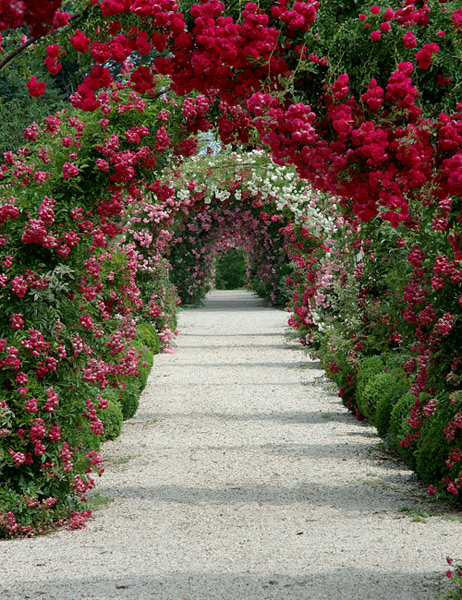FWP:
SETS == IDIOMS; WORDPLAY
JALVAH: {7,4}
ROAD: {10,12}
This verse, in Ghalib's favorite interrogative inshāʾiyah style, cleverly asks a question-- which it then even more cleverly doesn't answer, but leaves us to wonder and speculate about. On the idiom ḳhāk nahīñ , see {114,1}.
The speaker notices that the roadway is, most unusually, free of dust; instead, it's full of the jalvah of the rose. Is this the same as being full of roses? Surely not. Rather than a stretch of roadway physically piled with flowers (and thus perhaps even impassible), other possibilities are easier to imagine. The 'glory' of the rose could be an 'appearance' or public display of-- well, of something overpoweringly roselike. A radiance resembling that of roses? An appearance like that of roses? A roseate mood, or scent, or shimmer in the air, or vibration in the atmosphere? Scattered petals on the ground, where dust would normally be?
Whatever its exact nature, this rose-glory either replaces the usual dust (2a), or itself is the dust (2b), thus doubly emphasizing the 'red-carpet' treatment being prepared. And the presence of the glory/appearance of the rose, and the absence of (other) dust, cause the speaker to conclude that some possessor of 'paradise-qualities' [bihisht-shamāʾil] is arriving, and to wonder who it might be.
The operative word here is surely the unusual, arresting shamāʾil ; this is its only occurrence in the divan, and it surely deserves 'fresh word' credit. In its more obvious sense, it helps generate the implication that in paradise there's no dust, only roses, so when we notice that condition on earth we can guess that an emissary is arriving. But in its secondary meaning of 'northerly winds' (see the definition above), it could be a flow of 'paradise-winds', which would be exactly suited to blow all the dust away and replace it with rose-glory, so that the speaker would be noticing the arrival of (something compared to) an unusual, divinely delightful wind, and not necessarily a literal heavenly being.
My favorite possibility, though, is that the rose-glory itself is the arriver. After all, what is the essence of the (human or even divine) beloved except the glory/appearance of an ultimate Rose? This radiance fills up the roadway completely, as it fills up heaven and earth, as it fills the lover's heart and mind. In its presence nothing at all [ḳhāk nahīñ] can exist-- not even dust. Is this radiance all we can see, so that we have to wonder at the rest of its identity?
Ghalib has a number of 'dust' vs. 'glory/appearance' oppositions:
on these see {7,4}.

Nazm:
That is, in the roadway there is no dust, there is the glory/appearance of the rose. (123)
== Nazm page 123